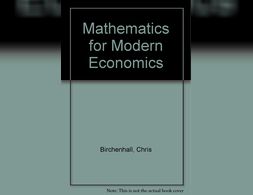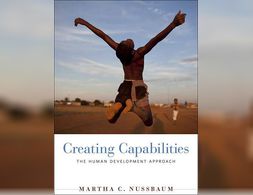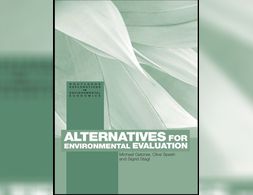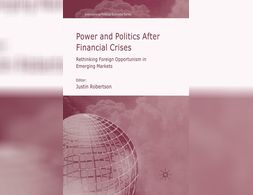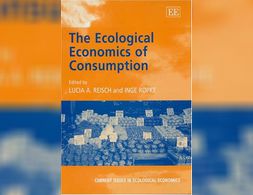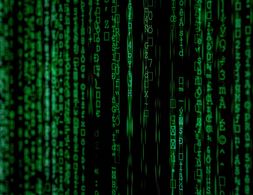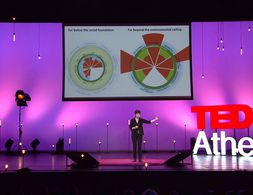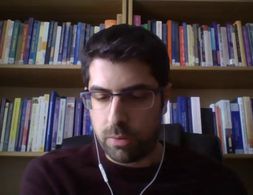✕
938 results
Designed for a single-semester undergraduate course, this introductory economics textbook updates traditional macroeconomics to encompass twenty-first century concerns. In contrast to standard texts, the book starts with the question of human well-being, and then examines how economic activities can contribute to or detract from it.
Designed to give second-year undergraduates an intuitive understanding of basic mathematical techniques, and when and why they are applicable. Building on the traditional framework of calculus, the notion of a concave function is used to link the new algebraic methods with the more familiar graphical approachoand to introduce the modern use of duality in economic analysis.
If a countrys Gross Domestic Product increases each year, but so does the percentage of its people deprived of basic education, health care, and other opportunities, is that country really making progress? If we rely on conventional economic indicators, can we ever grasp how the worlds billions of individuals are really managing?
As a response to ongoing economic, social and environmental crises, many private actors have enlarged their definition of 'value' to include environmental and social elements. Such practices, however, appear incompatible with the current epistemological structure of academic financial discourse.
The economics of worker cooperatives is a branch of economic inquiry with a long and esteemed pedigree, dating at least from the work of John Stuart Mill in the mid-nineteenth century.
In the graveyard of economic ideology, dead ideas still stalk the land.
The recent financial crisis laid bare many of the assumptions behind market liberalism—the theory that market-based solutions are always best, regardless of the problem. For decades, their advocates dominated mainstream economics, and their influence created a system where an unthinking faith in markets led many to view speculative investments as fundamentally safe.
Smith contends that there is no possible solution to our global ecological crisis within the framework of any conceivable capitalism. The only alternative to market-driven planetary collapse is to transition to a largely planned, mostly publicly-owned economy based on production for need, on democratic governance and rough socio-economic equality, and on contraction and convergence between the global North and South.
Environmental cost-benefit analysis was developed by economists in the belief that monetary valuation of the environmental repercussions of economic activity is essential if the "environment " stands any chance of being included in government and business decisions.
Foreign exploitation of economic crises in the developing world has been a central claim of neoliberal critics. This important and recurring international theme is the subject of closer scrutiny in this new collection, where contributors offer competing interpretations of the interaction between international and domestic forces after crises.
This groundbreaking collection explores the profound power of Social Reproduction Theory to deepen our understanding of everyday life under capitalism. It tackles issues such as child care, health care, education, family life and the roles of gender, race and sexuality, and shows how they are central to understanding the relationship between economic exploitation and social oppression.
Including contributions by: Lise Vogel, Nancy Fraser, David McNally and Susan Ferguson.
The volume, released by YSI’s Economic Development Working Group, comprises interviews with 13 scholars from around the world who express a variety of viewpoints on the meaning and relevance of dependency theory in today’s context.
In this searing and insightful critique, Adrienne Buller examines the fatal biases that have shaped the response of our governing institutions to climate and environmental breakdown, and asks: are the 'solutions' being proposed really solutions? Tracing the intricate connections between financial power, economic injustice and ecological crisis, she exposes the myopic economism and market-centric thinking presently undermining a future where all life can flourish.
In this 5 weeks online course, the Global Change Institute from the University of Queensland explains different types of climate change policies, the economic theory at their basis and the possible output. Starting from the fundamentals of carbon and climate change policies, and how they have been applied worldwide, the course aims to teach fundamental skills to move towards a low carbon economy.
Karl William Kapp (1910-1976) was one of the forefathers of Ecological Economics. Influenced namely by the Frankfurt School, Institutionalist Economics and Pragmatist Philosophy, he contributed to debates on the social costs of production, economic planning, sustainable development and epistemology. I
Research on consumption from an environmental perspective has exploded since the late 1990s. This important new volume cuts across disciplines to present the latest research in the field. The book is divided into three parts, the first of which addresses the problems of consumption both as a concept and as an economic and social force with high environmental impact.
"This eleven-week course offers a pluralist introduction to political economy and economics. We will examine nine (9) competing schools of thought, each of which offer an original and distinctive illumination of economic and social reality. The course offers a level of learning that would at least match that which is offered by a University. However, you do not need to be connected to a university or to have studied political economy or economics previously to enrol in this particular subject."
Alvin Roth and Lloyd Shapely won the Nobel Memorial Prize in Economic Sciences for their work on market design back in 2012, but it is a field that is still underrepresented in economics education. All markets have rules, and how these rules are set influence how the market functions.
In this teaching pack, we take a look at satellite crop monitoring and how it is used for both real and financial economic activities. By looking at commodity futures, we give students a sense of what financialization can mean. In the active exercise students learn to discuss these matters and reflect upon them.
Throughout 2022 it has become increasingly difficult for people around the world to meet their basic needs – even those who live in relative affluence in the Global North. This 30-minute classroom exercise takes this common recent experience as a starting point for an exploration of the different economic mechanisms and organisations that can be used to provide for people’s basic needs.
Traditionally, economists have attributed consistency and rational calculation to the action of ‘economic man’. In a powerful challenge to orthodox thinking, Geoffrey Hodgson maintains that social institutions play a central and essential role in molding preferences and guiding action: institutions are regarded as enabling action rather than merely providing constraints.
This course covers recent advances in behavioral economics by reviewing some of the assumptions made in mainstream economic models, and by discussing how human behavior systematically departs from these assumptions.
This episode of the Future Histories Podcast featuring Moira Weigel sets the development of digital capitalism and the right-ward shift in politics and society in relation to one another. It provides a masterful combination of ideology critique and polit-economic analysis grounded in comprehensive knowledge of the digital economy.
Potts (economics, University of Queensland) proposes evolutionary microeconomics as a synthesis of the collective schools of heterodox economic thought with complex systems theory and graph theory.
So, what does racism have to do with our 21st century economic system? How can we understand institutions who uphold racism while claiming to value diversity and inclusion? And what does it mean to truly be anti-racist?
Eco-modernisation’s promise that technological fixes will provide us with the efficiency we need to decouple environmental burdens from economic growth suggests that business-as-usual can continue. Today’s guest Timothée Parrique is the best to explain why this is not happening and why relying solely on technological solutions is like betting on green zero in roulette.
Why are income inequalities so large and why do they continue to increase in so many countries? What role can minimum wages play in reducing social and economic inequalities? What is a good system of wage bargaining? What constitutes a fair wage?
This talk was given at a local TEDx event, produced independently of the TED Conferences. Economic theory is centuries out of date and that's a disaster for ...
This is webinar series organized by the SOAS Open Economic Forum and the SOAS Economics Department with speakers from the same department as well as other academic figures.
This article considers the strengths of agent-based modelling and the ways that it can be used to help central banks understand the economy. These models provide a complement to more traditional economic modelling which has been criticised in the wake of the Great Recession.
Exploring Economics, an open-access e-learning platform, giving you the opportunity to discover & study a variety of economic theories, topics, and methods.
Exploring Economics, an open-access e-learning platform, giving you the opportunity to discover & study a variety of economic theories, topics, and methods.
Exploring Economics, an open-access e-learning platform, giving you the opportunity to discover & study a variety of economic theories, topics, and methods.
We use cookies on our website. Click on Accept to help us to make Exploring Economics constantly better!


